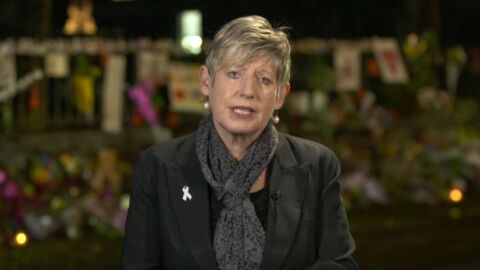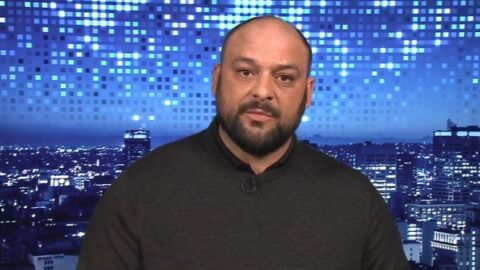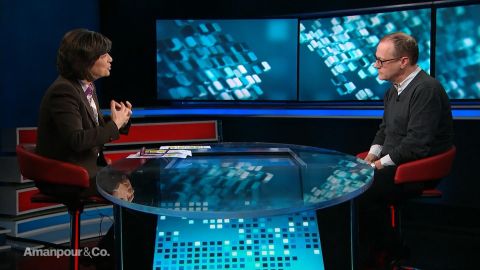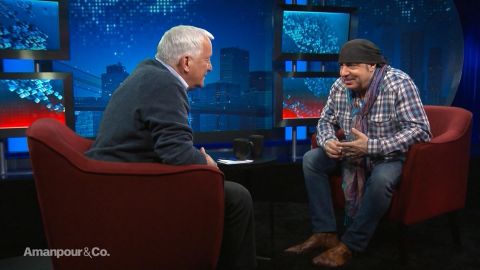Read Transcript EXPAND
But now it's time for us to turn to a musical and television legend.
You may know him as a founding member of Bruce Springsteen's iconic E Street Band, or as Silvio Dante, who was Tony Soprano's consigliere in The Sopranos.
But now Steven Van Zandt has a new passion project working to preserve music and arts education in American schools.
And he sits down with our Walter Isaacson to discuss his recent US teacher's solidarity tour and his new album, Summer of Sorcery. Wow.
Thanks for being here. My pleasure.
Have you a lot of pleasure to meet Springsteen.
You know, The Sopranos Soul Fire.
And now you're into education.
Explain how you got there.
You're become an advocate for music and education.
Yeah, it was a strange road when I didn't really intend to take.
But the music teachers came to me, I don't know, ten, 12 years ago now.
And they say, listen, this No Child Left Behind legislation has devastated all of the arts.
You know, there's something you can look into.
So I went to Congress.
I talked to Teddy Kennedy at the time, and Mitch McConnell, I said, listen, this No Child Left Behind legislation is doing a bad thing.
They said, yeah, we know, you know, with unintended consequences.
I said, Okay, okay. So fix it.
You know, they're like, not going to happen.
Okay.
So I said I came back to them and I thought about it.
I said, listen, we're not going to put instruments in kids hands for a while, so let's do the next best thing.
Let's do a music history curriculum.
You know, we want to keep the arts in the DNA of our education system somehow, you know, so let's avoid the high school years kind of focus on them on the middle school, because now high school is completely obsessed with testing.
And someday they're going to figure out that testing is not learning Okay.
But that's another discussion.
But right now, they have to do these tests and get higher scores on math and science.
You know, even though the arts usually improves math and science scores, you know.
So anyway, so I said, okay, let's do that.
I outlined 200 lessons and we worked on it for ten years.
So this is a whole curricula that teachers can use that takes rock music and says, Hey, if you use rock music, you can help teach everything.
Yes. It's not just rock music, but by popular music, you know, and we go all the way back.
We started the early 20th century with country blues, and you know, and go through all of right up to current times.
I also wanted to do something that kind of dealt with the modern world in the sense of this.
This this generation is different You know, it's probably the second biggest generation gap after ours and may even be the first biggest in the sense that these kids are different.
They're faster they're smarter.
They have no patience whatsoever, you know, and we have to kind of adjust to that.
So I thought, let's do something that works for them instead.
Of dragging them to our old methods of learning this now and someday you'll use it.
You know, it's not going to fly with these kids anymore.
You know, they're the ones they want something now.
They can use now.
You know that these are used to that device, giving them whatever they want every 10 seconds.
Right.
So I think we'll see whose music, you know, music, the perfect answer.
Every kids in the music, you know, and let's just go into a classroom and go to them, not drag them to us so that what you ask them, what's your favorite artist Every kid knows that answer. Right.
And let's trace them back.
Okay. You went to whoever it is.
Ariana Grande de or whatever she comes from this one.
That one comes from that one.
That one comes from Aretha Franklin.
And, you know, and so you trace the roots all the way back through music in the 20th century and give them a little context of the history of what was happening when that when that artist came out, when that song was written, why it was written, you know?
And what happens is they're engaged.
Know, you talk to any teacher today, what's the toughest thing?
You know, what was the biggest challenge?
Engaging the kids. Right.
And keeping them engaged.
Well, this engages them immediately because it's the one subject, the royal expert thing, which is their own taste.
You know, they know they know what they like.
And let's bring some attention to teachers who are just the most underappreciated underfunded, underpaid people.
And let's try to make them let's make them cool, you know, as cool as we can.
So we put aside four or 500 tickets, every single show teacher to come for free, bring a friend.
And we do an hour workshop in between the soundcheck and the show.
Because they have to do 20, 25 hours of professional development every year to to certify for their teaching certificate.
And they have to pay for it.
And their meager salaries. Right.
Let's give them an hour for free.
Hopefully it'll count towards their, their certificate.
Most places it does.
And we have the foundation people come out and do the workshop of how the, how the curriculum works.
So it was a way of connecting them to the curriculum directly.
You know, we're also working on the administration level and school board level.
New Jersey has adopted our curriculum now.
And, and then the first state, I think officially adopt theme from STEM.
You know, we put the A input into the curriculum.
And I'm hoping we're hoping to do that in every single state.
With your passion for the teachers, you're in Los Angeles on tour.
And one morning I wake up and you walk in the picket line on a strike with the L.A.
school teacher.
What was that all about?
Yeah, it was fun because I have to be there, you know, for a meeting.
And then I saw on the news what was happening.
I said, you know, let me go supportive of big I'm a big supporter of the unions and happily strike.
And they'd like, you know, they let you talk about being exposed to all of the art, you know, music and the various types of arts.
Did you ever think growing up as a kid in New Jersey you would not only be, you know, into music, be into radio, the end of vinyl, but also be into acting and television and everything else? You do?
Nah, nah.
We were just trying to make a living playing rock and roll, which was a miracle itself.
You know, that was such a long shot, you know, as our parents would often remind us, you know, what are you going to do?
Going to be a Beatle, you know?
Well, now, you put it that way, you know?
You know, February 9th, 1964.
The Beatles played Ed Sullivan.
And the day before, nobody had a band.
The day after, everybody had a band.
And you watched it.
Oh, yeah, yeah, yeah.
Me and 70 million others.
And it was you you know, they didn't all get out of the garage.
Okay.
Most of the bands, you know, but the dozen or so in our area that did, I had my band, he had his band.
So we were, we were immediately friends, you know, how long have you known Bruce Springsteen?
I know his best man.
Your wedding many decades ago. Have we had.
How have you evolved and changed together?
Let me say that. No, out loud.
Well, you know, we been for 50 years. You yeah, we were.
I was like 15. He was 16.
Things haven't changed much, to tell you truth, in 50 years.
I mean, we, you know, we got our own families in our own, you know, our own, our own.
You know, you live your own lives.
But not, not much has changed.
Tell me about the South Africa Crusade.
When I decided to make solo records, I decided, Okay, I'm gonna be the political guy.
I know there's a lot of artists showing up at demonstrations and protests and and doing a lot of great political work that started with the Grateful Dead and a Jefferson Airplane.
And it was a great tradition of, you know, political involvement that way.
But there wasn't a whole lot of it in the work so I wrote about Latin America with a lot up, and I see those and bitter fruits and various things I talked about.
And I ended up in South Africa with the one place I couldn't find that much information about.
And I'd heard if they were doing these reforms of the apartheid system and it was getting better.
You know, New York Times basically saying that they were invulnerable country, you know, very scary country.
Possibly with nuclear weapons.
And but they were reforming the government.
And so I went down there with a completely open mind hoping to see these reforms and instead I found the, uh, slavery in a modern slavery and, uh, and realize that this system can't be reformed, it has to be eliminated.
And the sports boycott had already happened.
It was very effective.
The ultimate homerun was the economic boycott, which would bring down the government in between with the cultural boycott so so let's focus on that and be a bridge to that, towards that economic boycott, at which point, you know, we will this government will fall.
They were copying our Native American reservations and creating these phony homelands and then create, you know, make those homelands independent countries in one of these phony homelands.
But put this one I was this resort called Sun City.
So they were enticing, paying big money for people to come play Sun City, violate the boycott and pretend that they weren't violating the boycott because it was a separate country.
Well, it wasn't a separate country.
So we wanted to expose that.
It's not a separate country.
It's a phony homeland.
And you are violating the boycott.
It is South Africa by playing there.
So don't play there anymore.
And we shut them down overnight.
The money is going to the Africa Fund uh, families of political prisoners, uh, South Africans in exile.
It was very, very, very successful then because of the publicity, the senators and congressmen, the kids were coming to them saying, What's a South Africa thing?
You know, we got MTV, we got these uncensored I'm not going to play.
Sun City became almost a mantra.
Oh, yeah, yeah.
And it got the whole movement re-energized.
And in the end, it was the first overall overriding of the basic legislation popped up to to cut them off economically.
Reagan vetoed it, and his veto was overridden for the first time.
And that was the end once that the dominoes started to fall and they had to let Mandela out and the government fell.
And your music has been very, very political, both yours and then yours with the E Street Band.
But recently your last albums aren't.
So tell me your view of politics in music.
My value at this moment is to maybe try and bring some common ground between that are very divisive, you know, divided nation, you know?
And so I wanted to I said, you know, and I announce this at the show.
I said, listen, well, we're not going to do any politics tonight.
Everybody's welcome.
You know, we're going to transport you by pure art, by pure music with this amazing band I put together.
And and we're not gonna we're not going to dwell on anything partizan, you know?
And so I haven't done anything partizan since I started this 12 years ago.
I didn't I didn't endorse Obama.
And I'm not criticizing Trump, you know, I want everybody to feel free and feel welcome.
When they come to the show.
It's about it's about the music.
You know, let me let me take you on a trip and get away from it for a minute.
You know, we need we need we need a sanctuary for the politics at this point, rather than me dragging people into awareness and consciousness about politics at this point, we need an actual break from it so our minds could even function the next day.
But we have to come back to this, you know, incredible onslaught of bad news every day.
You know, I think you're working on a new album.
Yeah, the new album is done.
It's coming out May 3rd.
I'm sorry. I hear some of sorcery.
I'm very, very proud of it.
It's a it's a big leap for me.
Um, artistically, it's the first nonpolitical album, really.
For the most part.
And it's also the first fictional album.
It's the first album I've done.
It's not not autobiographical.
It's trying to get away from me, me, me, you know, I'm sick of me.
You know, I want to make records like the records I grew up with, you know, you know, you know Sam Cooke, and the, you know, Smokey Robinson and The Beatles and Stones and all those great bands that were not specifically autobiographical for the most part.
You know, I wanted to I wanted to try that for the first time.
So I've succeeded in doing it, and I'm very, very proud of it.
And the tie in with this notion of the history of jazz and the history of music and enjoy it.
Well, it's my it's certainly it's an evolution for me, certainly of all my influences and work, you know, so I'm very proud of it.
That way you can hear where I'm coming from.
But now in the form of original songs as opposed to covers and AM. Yeah, before that, the, the, the tour is coming out on Blu ray, this whole fire tour and, and a seven album vinyl box we started playing on the radio.
Now the Paul McCartney joined me on stage, which I was thrilled about one of the highlights of my life.
The new album will come first week in May and it'll be a tour with that.
As a pioneer in Netflix, you know, with your show, how is Netflix and things like that?
Changed the nature of what you can do on TV?
Well, it was it was it was The Sopranos that changed everything, I think.
And that's pretty much recognized now.
And I took three, you know, elements, which was HBO being very courageous to give you the blank slate, you know, give the blank, you know, uh, you know, do it, you know, gave David Chase the freedom to do what he wanted to do.
It took David Chase, who's just a genius.
It took Jimmy Gandolfini to to to pull it off, you know?
So between HBO, David Chase and Jimmy Gandolfini, they created this thing that was new, which was a little bit more realistic.
You know, as you're watching Sopranos and you change the channel to other other shows, they looked quite false in comparison.
You know, the the way it was lit, you know, all the other shows all of a sudden looked over lit, you know, and and all kinds of camera moves.
And, you know, Sopranos was as close to, you know, uh, cinema verité, you know, the documentary as you can get.
You know, it was very you know, the camera didn't move with nothing seductive about it, nothing nothing artistically, you know, gimmicky, you know, and I still miss that on TV, you know, turning on a show and relating to the characters I don't see that anymore, you know, not not very often.
And it was David Chase who decided I was an actor before I knew I was an actor.
You know, I genuinely don't think there's anything to gain by keeping him around.
So he got you on The Sopranos.
How did that happen?
Yeah, he just saw me inducting The Rascals.
I am in the Hall of Fame.
Happen to be the first time was ever televised.
A lot of destiny at work here.
Well, out there and he just happened flipping around. And, you know, he had been a fan.
He had he had he had not only these three records, he had my solo records, you know, so he just, you know, call up said, you know, I want to be my new TV show.
And I said, not really.
No, I'm not an actor, you know.
Yes, you are. You.
Yeah, we don't know it yet.
So I had nothing better to do.
I pretty much been blackballed from the music business because of my success with South Africa.
You know, you could feed people in Africa, don't start bringing down governments.
You know, this is not smiled upon by the corporate world, you know?
So I was happy to be in the two places where history was made just by accident with Sopranos, bring this whole new consciousness to TV and then Netflix turning it into an international film.
You know, our show was really, really Ham was really the first international show I was in America, starring in a Norwegian show and it was all subtitled except for me, take care.
Where were you going to take care of forever?
Domestic.
Often three times the month on ice is breaking with the book a little bit.
I said the Ted Sarandos, Is it Ted?
Should I pick up the show? You want your first show?
Because that was Idol.
I mean, I love it.
But, you know, I mean, I was rooting for the guy.
I wanted them to win, you know, and have this whole new world for us, people who are content creators, you know, what a wonderful new thing if this Netflix actually succeeds, I want them to succeed.
I said, you know, your first show subtitles really?
He says, No, I like it.
It's very authentic.
And I was very proud of the fact that we're the only European show in history that wasn't remade for America.
Really, if you think about it, you know, almost everything else gets remade.
That show and the actual Norwegian actors who are just terrific, the great directors, cinematographers, and I'm the only one speaking English, you know, the interim band gets back together and you do something at the end of the year.
What are you hoping it would be?
Well, I would hope it would be a new album and a new tour with Bruce's work.
You know, it has to come.
It comes from him, you know, but I hope it would be like the old days, you know, where we were, you know, the band the band contributes to it.
And, you know, we always did.
You know, I always you know, at that time I was producing as well as, you know, helping with the arrangements.
And I and I would hope to do that again, whatever he wants, whenever he needs, you know, I'm there.
The band's there for him.
But I think we will I think we will get back together.
You know, I'm not sure when, but it'll happen eventually.
Louis Van Zandt, thanks for being with us, man.
My pleasure. My pleasure.
About This Episode EXPAND
Christiane Amanpour speaks with Lianne Dalziel, the Mayor of Christchurch, New Zealand, about gun reform; Christian Picciolini, a former Neo-Nazi, about how terrorists become radicalized; and Henry Singer, a filmmaker, about the Bosnian genocide. Walter Isaacson speaks with actor/musician Stevie Van Zandt about his career.
LEARN MORE



